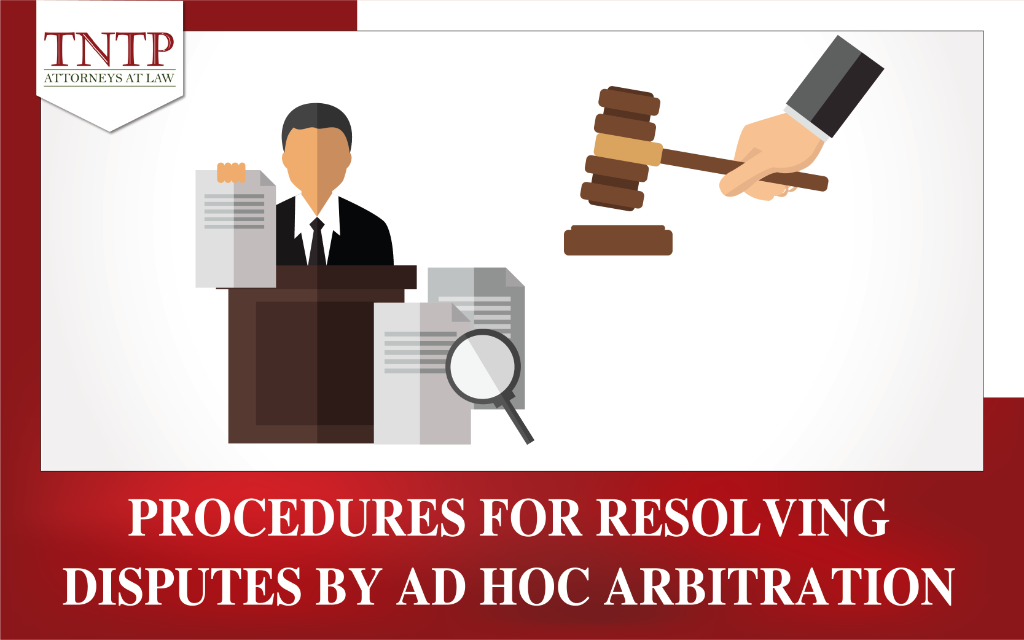Procedures for resolving disputes by ad hoc arbitration

Ad hoc arbitration is a form of arbitration widely used around the world. The arbitration laws of various countries recognize the existence of this form of arbitration. In Vietnam, Ad hoc arbitration is regulated in the 2010 Commercial Arbitration Law, primarily characterized by procedures and processes agreed upon by the parties. How is a commercial dispute resolved through Ad hoc arbitration? The following article will discuss the procedures and Procedures for resolving disputes by ad hoc arbitration that parties can refer to for implementation.
1. Filing a Lawsuit
The plaintiff is responsible for sending the lawsuit file to the defendant and the Arbitration Council. The arbitration proceedings start when the defendant receives the plaintiff’s lawsuit. Accordingly, the lawsuit file includes:
• A lawsuit petition;
• Arbitration agreement;
• Documents and evidence proving the lawsuit is based on valid and legal grounds (Contracts, Handover records, Contract termination records, and other documents);
• If the plaintiff is an individual: Certified copy of the plaintiff’s identity card;
• If the plaintiff is an organization: Certified copy of the Business Registration Certificate or establishment decision, operating license of the plaintiff, etc.; Certified copy of the legal representative’s identity card of the plaintiff;
• Certified copy of the Business Registration Certificate or establishment decision, operating license of the defendant (if any),…
Within 30 days from the date of receiving the plaintiff’s lawsuit and accompanying documents, the defendant must send a defence statement to the plaintiff and the arbitrator. If the parties disagree with an arbitrator to resolve the case, the defendant must send the plaintiff the arbitrator’s information, including the name and address.
If the defendant countersues the plaintiff, the defendant must send the counterclaim to the Arbitration Council and the plaintiff at the time of submitting the defense statement. Within 30 days of receiving the counterclaim, the plaintiff must send a defense statement to the Arbitration Council and the defendant.
2. Establishing the Ad hoc arbitration Council
Before or after a dispute arises, the parties can agree on the arbitrator(s) to resolve the case. The number of arbitrators can be one or three. If the case is resolved by three arbitrators, the president of the Arbitration Council must be determined. The president can be agreed upon by the parties or the arbitrators. If there is no other agreement between the parties, they will apply the provisions of Article 41 of the 2010 Commercial Arbitration Law to establish the Ad hoc Arbitration Council.
3. Paying Arbitration Fees
The parties can agree with the Arbitration Council on the arbitration fee. The fee is determined by the Arbitration Council. When filing a lawsuit, unless the parties agree otherwise, the plaintiff must pay the arbitration fee as required by the Arbitration Council. In case of a counterclaim, unless otherwise agreed by the parties, the defendant must pay the arbitration fee as required by the Arbitration Council. The losing party must bear the arbitration fee unless the parties agree otherwise or the Arbitration Council decides otherwise.
4. Preparing for Trial
At this stage, if deemed necessary or upon request by the parties, the Arbitration Council may:
• Verify the facts;
• Collect evidence;
• Summon witnesses;
• Apply temporary emergency measures.
Additionally, during the trial preparation, upon the parties’ request, the Arbitration Council may mediate to allow the parties to negotiate dispute resolution. If the parties reach an agreement on dispute resolution, the Arbitration Council will record a successful mediation with the signatures of the parties and the confirmation of the arbitrators. The Arbitration Council issues a decision recognizing the parties’ agreement. This decision is final and has the same value as an arbitration award.
5. Dispute Resolution Hearing
The parties may agree on the time, place of the dispute resolution hearing, arbitration language, and law applied to resolve the dispute. If the parties do not agree on these matters, the Arbitration Council will decide. The Arbitration Council will send a summons to the parties to attend the hearing.
The dispute resolution hearing is held in private unless otherwise agreed by the parties. The legal representatives or authorized representatives will attend the dispute resolution hearing, have the right to invite witnesses and defend their legitimate rights and interests. With the parties’ consent, the Arbitration Council may allow others to attend the dispute resolution hearing. The order and procedures of the dispute resolution hearing are agreed upon by the parties.
The arbitration award is issued either immediately at the hearing or the latest within 30 days from the end of the last hearing. The arbitration award must be sent to the parties immediately after issuance. The parties have the right to request a copy of the arbitration award from the Ad hoc Arbitration Council. The arbitration award is final and effective from the date of issuance.
Above is the article “Procedures for resolving disputes by ad hoc arbitration” sent to readers. Hopefully, the information provided is useful to those interested in this issue.
Best regards,



